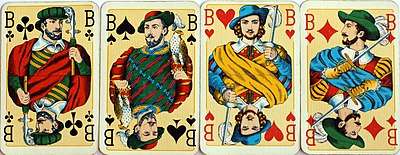Polskpas
Polskpas is a Scandinavian 5-card plain-trick game for four individual players using 24 cards.[1][2] Eldest hand has the first right to accept or make trumps. As is typical for Schafkopf card games, which are normally point-trick games, the four jacks are known as wenzels and form permanent highest trumps. The German game Kontraspiel is a similar to Polskpas.
 The four Wenzels | |
| Type | Trick-taking |
|---|---|
| Players | 4 |
| Cards | 24-card |
| Card rank (highest first) | (Js) A K Q 10 9 |
Rules of play
Tens are low. The Jacks or Wenzels are the highest members of the trump suit, ranking clubs, spades, hearts and diamonds in descending order. A Jack is not part of its natural suit unless this happens to be the trump suit.[3][4]
Each of the four players receives 5 cards in batches of 2 and 3. The remaining 4 cards are not usually part of the game, except for the first of them, which is turned face-up to determine the preferred trump suit.[3][4]
Starting with eldest hand, each player gets the chance to become soloist with the preferred suit as trumps. A player who accepts takes the turn-up card and discards a different card instead. If everybody passes, there is a second round in which each player gets the chance to become soloist with a different suit (and without exchanging the turn-up card). In the second round, eldest hand is the only player who is allowed to do this with the preferred suit. If the second round fails as well, the game is not played and the next dealer deals.[3][4]
The standard rules of trick-play as in Whist apply. Eldest hand leads to the first trick. Suit must be followed. The player who played the highest trump, or the highest card of the suit led, wins the trick and leads to the next. To win the game one must win 3 tricks. To make sure that there is always a winner, it is also enough to be the first player to win 2 tricks, so long as the other tricks do not all fall to the same player.[3][4]
Scoring
The game is played for money and uses a pot for the stakes. The dealer pays one unit into the pot before the game starts.[3][4]
If the soloist wins, he or she wins the contents of the pot. If the soloist loses, he or she doubles the contents of the pot.[3][4]
Up to the third trick, a soloist can announce vole, i.e. undertake to win all five tricks. If successful, the soloist wins the pot plus a fourth of its content in additional payments from each of the three opponents. If not (but the soloist still wins the game), the soloist receives nothing and the pot remains unchanged.[3][4]
Variations
Three players can play following the same rules, provided that the Nines and one Ten are removed from the pack.
History and etymology
The game appears in a Danish game anthology in 1829, and in a Danish encyclopedia in 1924. An early literary reference to the game was in 1786.[5] Although Polskpas is Danish for Polish passport, it appears more likely that pas refers to the game feature which allows eldest hand to pass rather than being obliged to play with the turn-up suit under all circumstances.
A somewhat later German game known as Kontraspiel or Contraspiel is similar to Polskpas, but there are only two Wenzels and the bidding system is more elaborate.
References
- Ferrall, J.S. (1845). Dansk-engelsk Ordbog (in Danish). Gyldendalske boghandel. p. 249. Retrieved 24 September 2018.
- Henningsen, P.; Langen, U. (2011). Hundemordet i Vimmelskaftet: – og andre fortællinger fra 1700-tallets København (in Danish). Politikens Forlag. p. 120. ISBN 978-87-7692-251-1. Retrieved 24 September 2018.
- Jørgensen, S. A. (1829), Nyeste Dansk Spillebog (in Danish), Copenhagen: Schubothe.
- Chr., Blanstrup, ed. (1924), Salmonsens Konversations Leksikon, Vol. XIX, Copenhagen: Schultz